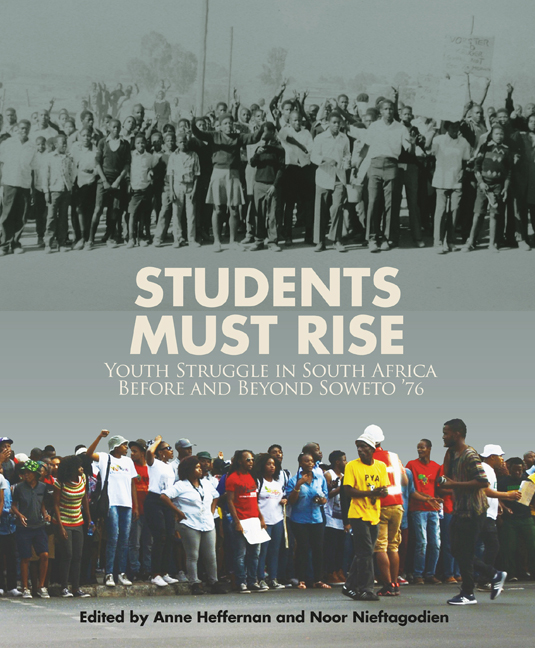Book contents
- Frontmatter
- Acknowledgements
- Contents
- Timeline
- Map Of South Africa
- Glossary
- Abbreviations
- Introduction: narratives of the student struggle
- Chapter 1 A brief history of the African Students’ Association
- Chapter 2 Youth and student culture: Riding resistance and imagining the future
- Chapter 3 The role of religion and theology in the organisation of student activists
- Chapter 4 Student organisation in Lehurutshe and the impact of Onkgopotse Abram Tiro
- Chapter 5 The University of the North: A regional and national centre of activism
- Chapter 6 Action and fire in Soweto, June 1976
- Chapter 7 What they shot in Alex
- Chapter 8 SASO and Black Consciousness, and the shift to congress politics
- Chapter 9 Youth politics and rural rebellion in Zebediela and other parts of the “homeland” of Lebowa, 1976–1977
- Chapter 10 My Journey, our journey: Activism at Ongoye University
- Chapter 11 ‘Let's begin to participate fully now in politics’: Student politics, Mhluzi township, 1970s
- Chapter 12 ‘They would remind you of 1960’: The emergence of radical student politics in the Vaal Triangle, 1972–1985
- Chapter 13 The ends of boycott
- Chapter 14 Fighting for ‘our little freedoms’: The evolution of student and youth politics in Phomolong township, Free State
- Chapter 15 ‘Every generation has its struggle’: A brief history of Equal Education, 2008–15
- Chapter 16 Contemporary student politics in South Africa: The rise of the black-led student movements of #RhodesMustFall and #FeesMustFall in 2015
- Selected Bibliography
Chapter 4 - Student organisation in Lehurutshe and the impact of Onkgopotse Abram Tiro
Published online by Cambridge University Press: 21 April 2018
- Frontmatter
- Acknowledgements
- Contents
- Timeline
- Map Of South Africa
- Glossary
- Abbreviations
- Introduction: narratives of the student struggle
- Chapter 1 A brief history of the African Students’ Association
- Chapter 2 Youth and student culture: Riding resistance and imagining the future
- Chapter 3 The role of religion and theology in the organisation of student activists
- Chapter 4 Student organisation in Lehurutshe and the impact of Onkgopotse Abram Tiro
- Chapter 5 The University of the North: A regional and national centre of activism
- Chapter 6 Action and fire in Soweto, June 1976
- Chapter 7 What they shot in Alex
- Chapter 8 SASO and Black Consciousness, and the shift to congress politics
- Chapter 9 Youth politics and rural rebellion in Zebediela and other parts of the “homeland” of Lebowa, 1976–1977
- Chapter 10 My Journey, our journey: Activism at Ongoye University
- Chapter 11 ‘Let's begin to participate fully now in politics’: Student politics, Mhluzi township, 1970s
- Chapter 12 ‘They would remind you of 1960’: The emergence of radical student politics in the Vaal Triangle, 1972–1985
- Chapter 13 The ends of boycott
- Chapter 14 Fighting for ‘our little freedoms’: The evolution of student and youth politics in Phomolong township, Free State
- Chapter 15 ‘Every generation has its struggle’: A brief history of Equal Education, 2008–15
- Chapter 16 Contemporary student politics in South Africa: The rise of the black-led student movements of #RhodesMustFall and #FeesMustFall in 2015
- Selected Bibliography
Summary
A village called Dinokana, near the town of Zeerust in what is today South Africa's North West Province (formerly the western Transvaal), is the birthplace of one of the most important leaders of the Black Consciousness movement, Onkgopotse Abram Tiro. Although he was tragically assassinated by a parcel bomb in February 1974, in Botswana, where he had gone into exile, Tiro had a profound influence on student politics in South Africa, and the development of Black Consciousness (BC) ideology and its affiliated organisations, under whose broad banner the youth of 1976 mobilised.
Tiro is remembered for his leadership role in a number of Black Consciousness organisations (SASO, SASM and BCP) and, perhaps most importantly, for a speech he gave at Turfloop's graduation ceremony in 1972, for which he was expelled from the university. In this famous speech, Tiro openly attacked the white and Bantustan authorities present at the ceremony as well as apartheid's Bantu Education system. Tiro's expulsion was a historical turning point as it inspired a series of solidarity protests in black campuses across the country, marking the embrace of confrontational action by SASO that was to culminate in the “Viva FRELIMO” rallies of 1974.
The focus of this essay is on lesser known aspects of Tiro's life – the rural world that made him, and the significant links that heretained with this world, particularly through mentoring younger generations of students from Lehurutshe, where Dinokana is located. Lehurutshe is a rural area stretching approximately 100 kilometres along the Botswana border north of the town of Zeerust. It was one of South Africa's native reserves (known as Moiloa's Reserve) and became part of the Bophuthatswana Bantustan during the apartheid era, until its reincorporation into South Africa in 1994.
While the 1976 student uprisings have been fairly well documented in Johannesburg's townships and black urban townships elsewhere, particularly on the Rand, the development of student politics in the large expanses of South Africa's countryside has been overlooked in historical accounts of the 1976 unrest and its origins. Rural politics, including student and youth politics, often tends to be viewed as derivative of events and actions taking place in the country's major cities, where political agency appears to originate, while local political dynamics and concerns rooted in the deep histories of localities, which give particular form and content to resistance on the ground elsewhere, are ignored.
- Type
- Chapter
- Information
- Students Must RiseYouth struggle in South Africa before and beyond Soweto ’76, pp. 34 - 44Publisher: Wits University PressPrint publication year: 2016



